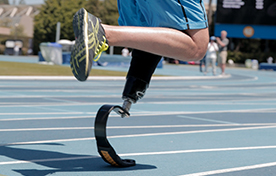Survival Perspectives
– by Rick Bowers
Whether you are born with a limb difference or lose a limb to a disease or injury, how you deal with it will largely determine the kind of life you will have afterward.
Why do some people who’ve lost a limb spiral downward, and why do others survive the loss, rebuild their lives, and, ultimately, even reach a high level of success in their profession, in a sport or hobby, or in their enjoyment of life?
To help shed light on this question, we asked several amputees and people who have had extensive experience with limb loss to tell us what they’ve learned over the years.
“It appears that people with limb loss who thrive tend to have family and friends that they can turn to for help, have good problem-solving skills, and are flexible in their life goals and how to achieve them. They also tend to have low levels of negative thinking and feel comfortable out in public with their amputation.”
— Stephen Wegener, PhD, member of the Amputee Coalition Medical Advisory Committee (MAC) and project leader for PALS (Promoting Amputee Life Skills) Plus, an Amputee Coalition self-management program for people with limb loss. Wegener is also on the faculty of the Johns Hopkins School of Medicine.
“Amputees are more likely to thrive if they receive education about limb loss from an informed person, such as a nurse or a peer visitor who is an amputee, if they have a great surgeon, if they have adequate inpatient or outpatient rehabilitation, if they receive a great prosthetic device, and if they receive excellent gait training.”
— Nancy Payne, RN, MSN, limb loss clinical nurse specialist
“Amputees who have thrived after limb loss are people who are not limited or defined by the new challenges they face. They are willing to explore their capacities and never lose their sense of humor or joie de vivre (love of life)!
— Natalie Fish, physical therapist, coordinator of physiotherapy services at Lindsay Rehabilitation Hospital in Montréal, Québec, Canada, and member of the Amputee Coalition’s MAC
“When I first became an amputee, I had to be a pillar of strength for my family, consequently repressing my own fears and sadness as a young 17-year-old. It’s important that you deal with your grief and issues early on so that you can adjust and then focus on reaching your potential.”
— Mona Patel, below-knee amputee, wife, mother of two, licensed clinical social worker and Amputee Coalition regional representative (Region I)
“I think the most important thing is to realize that every day is different. What works one day might not work the next day or week. Each day can be different and often is. If you hurt one day, you may not hurt the next. Also, don’t be afraid to ask! It’s your life and your prosthetic device. If there is something you don’t know, ask. And keep asking until you understand. Be it the medical professionals or the prosthetists, ask. Ask how it works, how it’s supposed to fit, and about skin tissue and breakdown.”
— Tammie Higginbotham, left below-knee amputee, Amputee Coalition-certified peer visitor, and Amputee Coalition regional representative (Region D)
“Since losing my left leg above the knee to cancer in 1995, I’ve learned that education and medical follow-up are key and lead to empowerment. I believe it’s our individual responsibility to learn to advocate for ourselves and essential for our health and well-being. For me, getting to the stage in recovery where I found myself forgetting the date of my amputation until it passed by, and regarding my limb loss and cancer as an inconvenience rather than a daily burden, was a sign of thriving.”
— Kathleen K. Spozio, Amputee Coalition Board of Directors (BOD) secretary and disability rights advocate
“All a leg is for is to get you from one place to another. It is not the center of your personality. It does not reflect on your character, who you really are, and what is in your head or in your heart. Rule #1: Life goes on. Rule #2: It’s going to be different. Rule #3: While some things will be worse and some things will never be again, some things may get much better.”
— Richard Friend, right above-the-hip amputee, support group leader, and Amputee Coalition regional representative (Region C)
“Being an amputee taught me some important things in life. I was never patient, but losing my leg taught me patience. I am more tolerant of the things that I have no control over. My husband died of a heart attack 3 months after I left the hospital, so I had to go back to work, which was a good thing. Working and staying busy is the key.”
— Maxine Lesline, above-knee amputee, Amputee Coalition-certified peer visitor, president of United Support for Amputees of the Midlands, and Amputee Coalition regional representative (Region G)
“After an amputation, many well-meaning people will advise you on what you can or can’t do physically. The lesson is to understand that although their advice may be well-intentioned, it is merely additional information and should not be internalized as your own limits. Whether we are able-bodied or use a prosthesis, it is our task in life to stretch ourselves to find our own limits. With amputation (and with life), what is possible is most often self-determined.”
— Jeffrey Cain, MD, bilateral below-knee amputee, member of the Amputee Coalition BOD and MAC, pilot, skier and adventurer
“I have learned that I was dealt a rotten hand – that I got a tough break and all of that. I have also learned that that’s life. In life, you are going to have ups and downs, highs and lows, joys and sorrows, so I go with it, accept it, and understand that life is a journey. And, finally, I learned that living with limb loss isn’t as scary as I first thought – not at all.”
— Charlie Steele, left below-knee amputee, member of the Amputee Coalition BOD and MAC, support group leader, Amputee Coalition-certified peer visitor and peer visitor trainer, and Amputee Coalition regional representative (Region B)
These are just a few thoughts on how to survive limb loss and to even thrive with it. The amputees here are busy people and have too much going on in their lives to dwell on what they have lost. They’re too busy getting on with the business of life.
Charlie Steele epitomizes this group. While explaining how he thrives with limb loss, he had to leave before finishing his answer. In doing so, he perhaps gave us the best answer of all. “Hey,” he said. “I have to go now. My granddaughter is waiting to challenge me to another game of basketball!”
Disclaimer: The following information is provided and owned by the Amputation Coalition of America and was previously published on the website http://www.amputee-coalition.org or the Coalitions Newsletter, inMotion.








